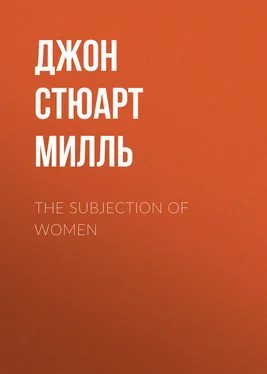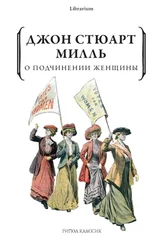Джон Милль - The Subjection of Women
Здесь есть возможность читать онлайн «Джон Милль - The Subjection of Women» — ознакомительный отрывок электронной книги совершенно бесплатно, а после прочтения отрывка купить полную версию. В некоторых случаях можно слушать аудио, скачать через торрент в формате fb2 и присутствует краткое содержание. Жанр: Философия, literature_19, foreign_antique, foreign_prose, на английском языке. Описание произведения, (предисловие) а так же отзывы посетителей доступны на портале библиотеки ЛибКат.
- Название:The Subjection of Women
- Автор:
- Жанр:
- Год:неизвестен
- ISBN:нет данных
- Рейтинг книги:4 / 5. Голосов: 1
-
Избранное:Добавить в избранное
- Отзывы:
-
Ваша оценка:
- 80
- 1
- 2
- 3
- 4
- 5
The Subjection of Women: краткое содержание, описание и аннотация
Предлагаем к чтению аннотацию, описание, краткое содержание или предисловие (зависит от того, что написал сам автор книги «The Subjection of Women»). Если вы не нашли необходимую информацию о книге — напишите в комментариях, мы постараемся отыскать её.
The Subjection of Women — читать онлайн ознакомительный отрывок
Ниже представлен текст книги, разбитый по страницам. Система сохранения места последней прочитанной страницы, позволяет с удобством читать онлайн бесплатно книгу «The Subjection of Women», без необходимости каждый раз заново искать на чём Вы остановились. Поставьте закладку, и сможете в любой момент перейти на страницу, на которой закончили чтение.
Интервал:
Закладка:
If people are mostly so little aware how completely, during the greater part of the duration of our species, the law of force was the avowed rule of general conduct, any other being only a special and exceptional consequence of peculiar ties – and from how very recent a date it is that the affairs of society in general have been even pretended to be regulated according to any moral law; as little do people remember or consider, how institutions and customs which never had any ground but the law of force, last on into ages and states of general opinion which never would have permitted their first establishment. Less than forty years ago, Englishmen might still by law hold human beings in bondage as saleable property: within the present century they might kidnap them and carry them off, and work them literally to death. This absolutely extreme case of the law of force, condemned by those who can tolerate almost every other form of arbitrary power, and which, of all others, presents features the most revolting to the feelings of all who look at it from an impartial position, was the law of civilized and Christian England within the memory of persons now living: and in one half of Anglo-Saxon America three or four years ago, not only did slavery exist, but the slave trade, and the breeding of slaves expressly for it, was a general practice between slave states. Yet not only was there a greater strength of sentiment against it, but, in England at least, a less amount either of feeling or of interest in favour of it, than of any other of the customary abuses of force: for its motive was the love of gain, unmixed and undisguised; and those who profited by it were a very small numerical fraction of the country, while the natural feeling of all who were not personally interested in it, was unmitigated abhorrence. So extreme an instance makes it almost superfluous to refer to any other: but consider the long duration of absolute monarchy. In England at present it is the almost universal conviction that military despotism is a case of the law of force, having no other origin or justification. Yet in all the great nations of Europe except England it either still exists, or has only just ceased to exist, and has even now a strong party favourable to it in all ranks of the people, especially among persons of station and consequence. Such is the power of an established system, even when far from universal; when not only in almost every period of history there have been great and well-known examples of the contrary system, but these have almost invariably been afforded by the most illustrious and most prosperous communities. In this case, too, the possessor of the undue power, the person directly interested in it, is only one person, while those who are subject to it and suffer from it are literally all the rest. The yoke is naturally and necessarily humiliating to all persons, except the one who is on the throne, together with, at most, the one who expects to succeed to it. How different are these cases from that of the power of men over women! I am not now prejudging the question of its justifiableness. I am showing how vastly more permanent it could not but be, even if not justifiable, than these other dominations which have nevertheless lasted down to our own time. Whatever gratification of pride there is in the possession of power, and whatever personal interest in its exercise, is in this case not confined to a limited class, but common to the whole male sex. Instead of being, to most of its supporters, a thing desirable chiefly in the abstract, or, like the political ends usually contended for by factious, of little private importance to any but the leaders; it comes home to the person and hearth of every male head of a family, and of every one who looks forward to being so. The clodhopper exercises, or is to exercise, his share of the power equally with the highest nobleman. And the case is that in which the desire of power is the strongest: for every one who desires power, desires it most over those who are nearest to him, with whom his life is passed, with whom he has most concerns in common, and in whom any independence of his authority is oftenest likely to interfere with his individual preferences. If, in the other cases specified, powers manifestly grounded only on force, and having so much less to support them, are so slowly and with so much difficulty got rid of, much more must it be so with this, even if it rests on no better foundation than those. We must consider, too, that the possessors of the power have facilities in this case, greater than in any other, to prevent any uprising against it. Every one of the subjects lives under the very eye, and almost, it may be said, in the hands, of one of the masters – in closer intimacy with him than with any of her fellow-subjects; with no means of combining against him, no power of even locally over-mastering him, and, on the other hand, with the strongest motives for seeking his favour and avoiding to give him offence. In struggles for political emancipation, everybody knows how often its champions are bought off by bribes, or daunted by terrors. In the case of women, each individual of the subject-class is in a chronic state of bribery and intimidation combined. In setting up the standard of resistance, a large number of the leaders, and still more of the followers, must make an almost complete sacrifice of the pleasures or the alleviations of their own individual lot. If ever any system of privilege and enforced subjection had its yoke tightly riveted on the necks of those who are kept down by it, this has. I have not yet shown that it is a wrong system: but every one who is capable of thinking on the subject must see that even if it is, it was certain to outlast all other forms of unjust authority. And when some of the grossest of the other forms still exist in many civilized countries, and have only recently been got rid of in others, it would be strange if that which is so much the deepest-rooted had yet been perceptibly shaken anywhere. There is more reason to wonder that the protests and testimonies against it should have been so numerous and so weighty as they are.
Some will object, that a comparison cannot fairly be made between the government of the male sex and the forms of unjust power which I have adduced in illustration of it, since these are arbitrary, and the effect of mere usurpation, while it on the contrary is natural. But was there ever any domination which did not appear natural to those who possessed it? There was a time when the division of mankind into two classes, a small one of masters and a numerous one of slaves, appeared, even to the most cultivated minds, to be a natural, and the only natural, condition of the human race. No less an intellect, and one which contributed no less to the progress of human thought, than Aristotle, held this opinion without doubt or misgiving; and rested it on the same premises on which the same assertion in regard to the dominion of men over women is usually based, namely that there are different natures among mankind, free natures, and slave natures; that the Greeks were of a free nature, the barbarian races of Thracians and Asiatics of a slave nature. But why need I go back to Aristotle? Did not the slaveowners of the Southern United States maintain the same doctrine, with all the fanaticism with which men cling to the theories that justify their passions and legitimate their personal interests? Did they not call heaven and earth to witness that the dominion of the white man over the black is natural, that the black race is by nature incapable of freedom, and marked out for slavery? some even going so far as to say that the freedom of manual labourers is an unnatural order of things anywhere. Again, the theorists of absolute monarchy have always affirmed it to be the only natural form of government; issuing from the patriarchal, which was the primitive and spontaneous form of society, framed on the model of the paternal, which is anterior to society itself, and, as they contend, the most natural authority of all. Nay, for that matter, the law of force itself, to those who could not plead any other, has always seemed the most natural of all grounds for the exercise of authority. Conquering races hold it to be Nature's own dictate that the conquered should obey the conquerors, or, as they euphoniously paraphrase it, that the feebler and more unwarlike races should submit to the braver and manlier. The smallest acquaintance with human life in the middle ages, shows how supremely natural the dominion of the feudal nobility over men of low condition appeared to the nobility themselves, and how unnatural the conception seemed, of a person of the inferior class claiming equality with them, or exercising authority over them. It hardly seemed less so to the class held in subjection. The emancipated serfs and burgesses, even in their most vigorous struggles, never made any pretension to a share of authority; they only demanded more or less of limitation to the power of tyrannizing over them. So true is it that unnatural generally means only uncustomary, and that everything which is usual appears natural. The subjection of women to men being a universal custom, any departure from it quite naturally appears unnatural. But how entirely, even in this case, the feeling is dependent on custom, appears by ample experience. Nothing so much astonishes the people of distant parts of the world, when they first learn anything about England, as to be told that it is under a queen: the thing seems to them so unnatural as to be almost incredible. To Englishmen this does not seem in the least degree unnatural, because they are used to it; but they do feel it unnatural that women should be soldiers or members of parliament. In the feudal ages, on the contrary, war and politics were not thought unnatural to women, because not unusual; it seemed natural that women of the privileged classes should be of manly character, inferior in nothing but bodily strength to their husbands and fathers. The independence of women seemed rather less unnatural to the Greeks than to other ancients, on account of the fabulous Amazons (whom they believed to be historical), and the partial example afforded by the Spartan women; who, though no less subordinate by law than in other Greek states, were more free in fact, and being trained to bodily exercises in the same manner with men, gave ample proof that they were not naturally disqualified for them. There can be little doubt that Spartan experience suggested to Plato, among many other of his doctrines, that of the social and political equality of the two sexes.
Читать дальшеИнтервал:
Закладка:
Похожие книги на «The Subjection of Women»
Представляем Вашему вниманию похожие книги на «The Subjection of Women» списком для выбора. Мы отобрали схожую по названию и смыслу литературу в надежде предоставить читателям больше вариантов отыскать новые, интересные, ещё непрочитанные произведения.
Обсуждение, отзывы о книге «The Subjection of Women» и просто собственные мнения читателей. Оставьте ваши комментарии, напишите, что Вы думаете о произведении, его смысле или главных героях. Укажите что конкретно понравилось, а что нет, и почему Вы так считаете.











